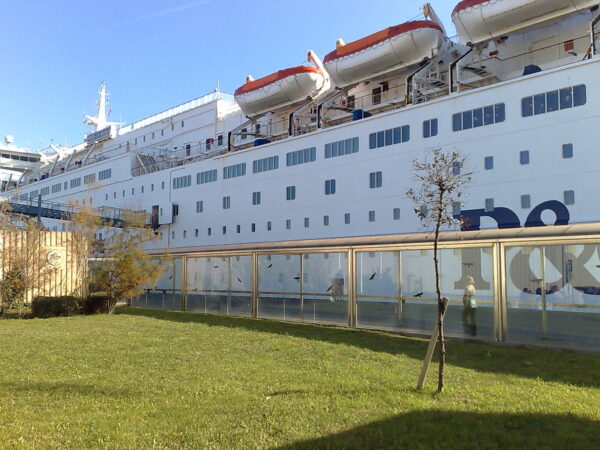Should the government of United Arab Emirates or the UK own P&O Ferries?
The chaos at Dover is a sign of the economic contradictions of Brexit.

The Easter getaway has been blighted by on-going chaos at Dover. Exporters of perishable food described Operation Brock, the emergency queuing system for freight traffic, as an “unmitigated disaster”. Lorry drivers were left waiting up to 30 hours without basic facilities, in order to get export produce into the European market. Needless to say, the whole affair is a disaster for British capitalism, further compounding exporters’ Brexit woes.
A key cause of the on-going crisis is the fallout from P&O’s summary sacking of 800 staff. With the new employees brought in to replace the sacked crew members allegedly paid as little as £1.80 an hour (exploiting a loophole in minimum wage legislation), and even the company admitting the average rate was only £5.50, health and safety inspectors have kicked into action. A number of P&O ships have been stopped from sailing while inspections are carried out to determine whether the new staff have the skills to uphold expected safety standards. This hire and refire crisis makes a mockery of Boris Johnson’s claim to want to build a “high wage, high productivity economy”. But it also reveals broader fault lines in the Brexit project.
As we’ve noted on Brexit Spotlight, P&O is feeling the pinch from the challenges facing the haulage and export industries with the UK’s exit from the single market. But this is also a story about a kleptocratic globalisation model and the role of oil rich dictatorships in our economy. P&O is a state-owned company – it’s just not owned by the UK state, and certainly not accountable to UK tax-payers. The ferry operator is controlled by DP World, a subsidiary of Dubai World, which is wholly owned by the United Arab Emirates (UAE), the oil rich gulf state with a unique federal political structure made up of a series of absolute monarchies. Dubai and Abu Dhabi are the most powerful of these ‘emirates’. A massive player in the global maritime sector, DP World claims to control 10% of global freight trade and made profits of $3.8 billion in 2021. What’s more, UAE have been a major backer of the UK governments’ freeport project, winning the praise of Chancellor Rishi Sunak last year for its investment in the London Gateway port.
Explaining the P&O crisis
As this suggests, there are a mix of factors that stand behind the P&O crisis. First, this is a story of the UK’s long hollowed out employment rights – which makes it much easier for employers to sack staff than in most other western European economies. Second, the same economic thinking assumes foreign direct investment is always good regardless of the public interest at stake, even when it means selling assets to very aggressive firms determined to restructure them to ratchet up the exploitation of workers as much as possible. This has also led to a situation where, from football clubs to ferries, the UK are only too happy to do business with dictators and kleptocrats who are involved in, or supporting, horrific human rights abuses. Third, the case also shows how this has a detrimental knock-on effect on other aspects of the economy – including other capitalist firms, like UK exporters, that need secure and well run infrastructure in order to trade with Europe, especially when Brexit has added to their costs.
That’s why the case of P&O Ferries illustrates the basic contradiction of Brexit. For most of its Conservative parliamentary supporters, it was about turbo-charging this “greed is good” economic model, slashing employment and social rights to unleash an even more rapacious capitalism. But for many Brexit voters it was seen as the opposite. They looked at Remainers like David Cameron and George Osborne and hoped that the Brexit vote would deliver a release from this extremely unequal society.
Ultimately, this group of voters are still disenfranchised. There has, for example, been hardly any discussion in British politics of the obvious remedy to the unacceptable P&O situation. Rather than the company being owned by, and run in the interests of, the UAE, the UK government could nationalise it so that it can serve the public interest.
April 18, 2022
Brexit Spotlight is run by Another Europe Is Possible. You can support this work by joining us today. The website is a resource to encourage debate and discussion. Published opinions do not necessarily represent those of Another Europe.





